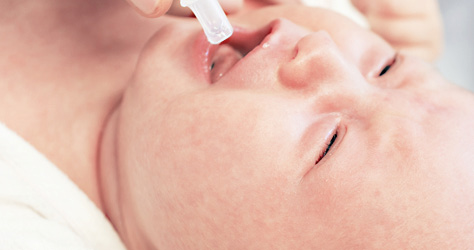It is important to only give babies medicines which are safe for their age and weight, and to follow dosage instructions closely…

Thankfully, most common baby illnesses get better without medicines and actually strengthen your baby’s immune system. However, sometimes your baby may need a little extra help in the form of prescribed or over-the-counter medicines.
At a glance
- Staying safe with medicines
- Suitable medicines by age
- Do-nots
- Side effects

Paracetamol or ibuprofen
If your baby has mild pain or is feverish, paracetamol or ibuprofen in liquid form may be suitable. Some paracetamol medicines are suitable from two months and some ibuprofen from three months. Always check with your pharmacist that a medicine is suitable for your baby’s age and weight.
Products containing ibuprofen or paracetamol, like all medicines, should not be used long term without a proper diagnosis. If your baby’s symptoms do not settle within 24 hours, consult your GP.
As with all medicines, it is important that you do not exceed the recommended dosage. Use the dosage measurer provided, rather than a spoon for example. You may find it helpful to note down the time of each dose so that you can keep track.
Do not give your baby:
- Paracetamol if they are under two months or ibuprofen if they are under three months. Seek medical advice so that they can be checked by a professional.
- Ibuprofen if you suspect your little one may have chicken pox, unless advised to do so by your doctor, as it may cause serious skin infections.
- Any adult medicines.
- Medicines containing ibuprofen, unless on the advice of your doctor. Some special ‘junior’ medications with ibuprofen are available for babies over three months old.
- Any medicines containing aspirin.
- More than the recommended amount in 24 hours.
Before giving your baby over-the-counter medication, check:
- That the medicine is recommended for babies.
- You’re giving the right dosage.
- How the medicine should be stored.
- It is always best to ask the pharmacist so that they can reassure you.
Prescribed Medicines
If your doctor has prescribed a medicine for your baby, make sure you know:
- What it is and why they are prescribing it.
- How often it should be given.
- When to stop giving it (your baby should always finish a course of antibiotics).
- Any possible side effects.
Antibiotics
Antibiotics
These only work when your baby has an infection caused by bacteria (not a virus). Antibiotics are always prescribed for a fixed number of days and taking all of them will reduce the risk of the infection recurring. So carry on with them even if your baby seems better.
Antibiotics need to be given at strict time intervals so that their level is maintained in your baby’s bloodstream. Setting an alarm to remind you when the next dose is due might help.
Steroid Creams
Steroid creams can work wonders with skin complaints such as eczema. Apply sparingly and only use for the necessary amount of time as steroid creams can thin the skin. As always, seek medical advice if you are unsure.
Side-effects
If your baby reacts badly to any medicine and you are concerned, stop using it and seek medical advice immediately.
If your baby has been diagnosed with an illness and you want to learn more about it, our A-Z of Health may help. Bounty wishes you both better soon x
Visit our sponsor Nurofen and read about the Confidence Collective Kit.